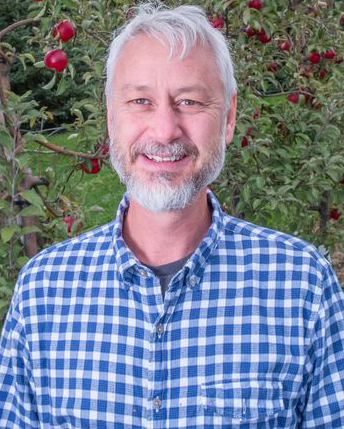Todd Einhorn named Bukovac Professor in Tree Fruit Physiology
New position in MSU Department of Horticulture focuses on advancing tree fruit research and partnerships with industry

Todd Einhorn is passionate about fruit tree physiology, or how a fruit tree functions. He’s shared this through research, outreach and teaching efforts during his four years with the Michigan State University (MSU) Department of Horticulture.
Now, he’ll have a greater opportunity to advance research and partnerships in the tree fruit industry as the Department’s Martin and Judith Bukovac Professor in Tree Fruit Physiology.
Funded by a $1 million endowment from Horticulture Professor Emeritus Martin “John” Bukovac and his late wife, Judith, the position aims to support research and outreach efforts that benefit Michigan’s tree fruit industry. Now retired, Bukovac worked for the department for 40 years.
“Dr. Einhorn is very deserving of this honor based upon his past accomplishments in tree fruit physiology, and his potential for continued impactful contributions to the discipline and the success of the industry,” said Vance Baird, Horticulture chair.
The professorship, a three-year appointment, offers flexibility and freedom for Einhorn to continue his research on cold hardiness, or the lowest temperature threshold, a plant can tolerate.
“Fruit growers can lose their entire crop with a frost event in the spring as the flower buds are developing between winter dormancy and bloom,” Einhorn said. “We can also lose the stone fruit crop, such as cherries and peaches, when we get a very cold mid-winter freeze event.”
Different crops and cultivars have different levels of cold hardiness. It’s a dynamic interplay between genetics and environment that is ever-changing. As the weather warms in spring and plants come out of dormancy, they are more susceptible to freezing at higher temperatures. For example, apple flowers (in buds) can survive in -30°F in the winter, but will die at 28°F in early spring before bloom.
“Our goal is to predict and project these changes, so we have a firm handle on where our cultivars stand within the developmental period from dormancy until bloom. This will provide critical crop protection information to growers,” Einhorn said. “The difference between a full crop and no crop is typically only a few degrees.”
Einhorn is looking forward to discussing this research with Bukovac, who, prior to the novel coronavirus pandemic, would visit with Einhorn often. The two share similar research interests.
“Even though Dr. Bukovac has been retired for years, he would come in two, three times a week and this would allow for exciting and beautiful conversations about research. He's incredibly insightful and knowledgeable,” Einhorn said. “I'm actually really excited to have the opportunity to discuss our research with him as we are developing it.”
The position also increases potential collaboration with other entities and institutions, thanks to its financial flexibility.
“Dr. Bukovac is an incredible scientist and visionary,” Einhorn said. “He intended for this professorship to bring new knowledge and skills to MSU that would advance fruit science, but also produce solutions for Michigan growers.”
Einhorn has established research partnerships with U.S. Department of Agriculture (USDA) scientists at universities throughout the country and internationally at two research centers in Spain: Centro de Investigación y Tecnología Agroalimentaria de Aragón (The Center for Agrifood and Research Technology [CITA]) in Zaragosa, and the Institute of Agrifood Research and Technology (IRT) in Lleida.
“This endowment provides funding to strengthen these partnerships and ultimately bring valuable research expertise to MSU and, by extension, our stakeholders,” said Einhorn. “I expect the endowment to serve as seed funding, allowing us to explore the mechanisms of cold hardiness that will in turn lead to additional funding opportunities.”
“As the Bukovac Professor in Tree Fruit Physiology, Einhorn will be able to work with and influence our next generation of scientists/educators and industry leaders,” said Baird.
In his four decades of work, plus additional projects in retirement, Bukovac has seen firsthand the importance of tree fruit physiology research.
“Resolving field/orchard problems, like Einhorn’s work does, can be very rewarding and deeply appreciated by the growers and the fruit industry,” said Bukovac. “In many, if not most instances, major improvements lead to an improved income and economy.”
Einhorn has already developed strong relationships with Michigan’s tree fruit industry through his research, outreach and teaching. He’s looking forward to strengthening them — and continuing Bukovac’s legacy — in his new role.
“MSU has an outstanding reputation with our industry stakeholders in tree fruit,” said Einhorn. “They are incredibly supportive of our efforts and look very favorably at the university, and this is the direct result of the many significant and impactful contributions of our previous faculty members.
“Dr. Bukovac was exemplary in this way. He paved the way through the outstanding program he directed— and you still see the effects of that today.”



 Print
Print Email
Email
